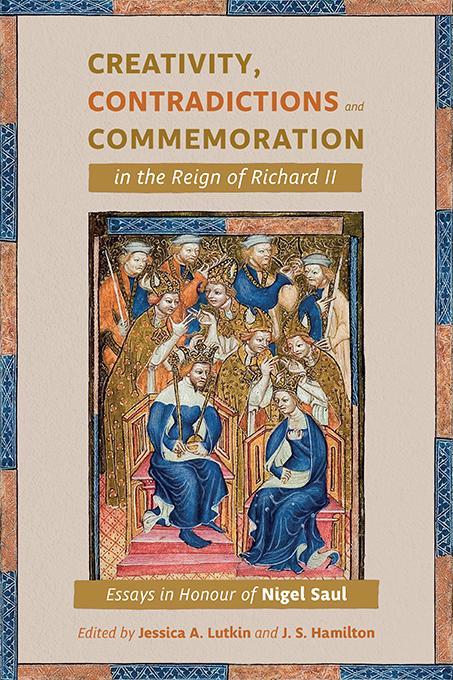 Creativity, Contradictions and Commemoration in the Reign of Richard II
Creativity, Contradictions and Commemoration in the Reign of Richard II 5 - Lollards in Arms: Lollardy, Loyalty, and the Trauma of the Hundred Years War
Published online by Cambridge University Press: 26 May 2022
Summary
In his 2002 article, ‘A Farewell to Arms? Criticism of Warfare in Late Fourteenth-Century England’, Nigel Saul argues that views about warfare and the role of the knight had changed by the end of the fourteenth century. Using examples from contemporary literature, Saul surveys complaints from the early decades of that century incorporating targeted criticism of the financial burdens of war and more general complaints about the evils of the time. He then shifts his study to explore poetry from the end of the century, mainly John Gower's Latin poem Vox Clamantis, that change these criticisms to something more ‘introspective, almost pained’. Gower's views about knights are further developed in his last poem, Confessio Amantis, and it is through this poem, Saul argues, that Gower voices his strongest reproach of knights who ‘make werres and to pile / For lucre and for no other skyle.’ Saul's survey of literature goes on to include Chaucer's Tale of Melibee and Sir Thopas, claiming that ‘nowhere in Chaucer's work do we find the fascination with knightly combat that excited Froissart’. And he ends with The Two Ways of Sir John Clanvow, a career knight and friend of Chaucer, who ‘emphatically rejects the values of his own class’.
So what caused this change in views about knighthood that is so clearly seen in the literature of the late fourteenth century? A variety of factors are proposed by Saul, but most persuasively the fact that through the earlier phases of the Hundred Years War with France, many ‘substantial fortunes were being won’ and the knightly class had become a ‘professional class of mercenaries and freebooters’. This, coupled with the significant loss of English-controlled territory in France in the 1370s and early 1380s, left the government of England ‘with little taste for war’. Another voice heard at this time, Saul maintains, was that of the religious reformer John Wyclif and the heretical movement he inspired known as Wycliffism or Lollardy. While Lollard pacifism represented more marginal views, their concerns can be seen in the ‘more solidly mainstream figure of Gower’ and eventually in the decision made by Richard II to seek peace with the French. As Saul concludes, for Richard and England in the 1380s and 1390s, ‘the blessings of peace were esteemed more highly than the heroism of war’.
- Type
- Chapter
- Information
- Creativity, Contradictions and Commemoration in the Reign of Richard IIEssays in Honour of Nigel Saul, pp. 97 - 120Publisher: Boydell & BrewerPrint publication year: 2022


